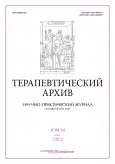Data from the Russian Severe Asthma Registry (RSAR)
- Authors: Belevskiy A.S.1, Nenasheva N.M.2, Kravchenko N.Y.3,4, Makar'iants N.N.5, Kuntsev D.A.3
-
Affiliations:
- Pirogov Russian National Research Medical University
- Russian Medical Academy of Continuous Professional Education
- Research Institute of Health Organization and Medical Management
- Research Institute of Pulmonology
- Central Research Institute of Tuberculosis
- Issue: Vol 94, No 7 (2022)
- Pages: 865-871
- Section: Original articles
- URL: https://journals.rcsi.science/0040-3660/article/view/109739
- DOI: https://doi.org/10.26442/00403660.2022.07.201713
- ID: 109739
Cite item
Full Text
Abstract
Aim. Creation of the "Russian register of patients with severe asthma" and obtaining data on the population characteristics of patients with severe asthma (SA), the prevalence of SA phenotypes, treatment outcomes and the degree of disease control.
Materials and methods. Observational non-interventional study, which consists in the data analysis obtained on the basis of registration cards of the Russian Register of Patients with Severe Bronchial Asthma, data collection in which was carried out on the Oracle XE platform. Statistical data processing was carried out using Power BI, PSPP and Microsoft Excel spreadsheets.
Results. The study included 4376 adult patients (mean age 60.6±13.5 years, 65% women) diagnosed with SA from 57 regions of Russia for the period from June 2018 to December 2021. T2 inflammation was detected in 94.8% of patients when determining blood eosinophils and IgE of blood serum; 69% of patients with SA corresponded to the allergic phenotype. 83.3% of patients had no control of BA and 53% had 1 or more exacerbations of BA per year. 8% of patients received systemic corticosteroids as a permanent therapy, while biologics – 10.6%.
Conclusion. The vast majority of adult patients with SA correspond to the T2 phenotype, have uncontrolled asthma with a high frequency of exacerbations and reduced lung function. A more favorable course of the disease was noted in patients receiving biological therapy, which requires appropriate measures to increase the possibility of access to this type of therapy.
Keywords
Full Text
##article.viewOnOriginalSite##About the authors
Andrey S. Belevskiy
Pirogov Russian National Research Medical University
Author for correspondence.
Email: pulmobas@yandex.ru
ORCID iD: 0000-0001-6050-724X
д-р мед. наук, проф., зав. каф. пульмонологии; президент Российского респираторного общества, гл. внештат. специалист-пульмонолог
Russian Federation, MoscowNatalia M. Nenasheva
Russian Medical Academy of Continuous Professional Education
Email: pulmobas@yandex.ru
ORCID iD: 0000-0002-3162-2510
д-р мед. наук, проф., зав. каф. аллергологии и иммунологии
Russian Federation, MoscowNatalia Yu. Kravchenko
Research Institute of Health Organization and Medical Management; Research Institute of Pulmonology
Email: pulmobas@yandex.ru
ORCID iD: 0000-0001-5228-7793
зав. организационно-методическим отд. по аллергологии-иммунологии и пульмонологии; рук. Научно-методического центра и мониторинга и контроля болезней органов дыхания
Russian Federation, Moscow; MoscowNatalia N. Makar'iants
Central Research Institute of Tuberculosis
Email: pulmobas@yandex.ru
ORCID iD: 0000-0002-6390-8759
д-р мед. наук, вед. науч. сотр., рук. отд. дифференциальной диагностики и экстракорпоральных методов лечения
Russian Federation, MoscowDmitry A. Kuntsev
Research Institute of Health Organization and Medical Management
Email: pulmobas@yandex.ru
ORCID iD: 0000-0003-0099-8993
программист организационно-методического отд. по аллергологии-иммунологии и пульмонологии
Russian Federation, MoscowReferences
- Global Initiative for Asthma. Global strategy for asthma management and prevention. (GINA 2021). Available at: https://ginasthma.org. Accessed: 14.04.2022.
- Global burden of 369 diseases and injuries in 204 countries and territories, 1990–2019: a systematic analysis for the Global Burden of Disease Study 2019. Lancet. 2020;396(10258):1204-22. doi: 10.1016/S0140-6736(20)30925-9
- Chung KF, Wenzel SE, Brozek JL, et al. International ERS/ATS guidelines on definition, evaluation and treatment of severe asthma. Eur Respir J. 2014;43:343-73. doi: 10.1183/09031936.00202013
- Hekking P-PW, Wener RR, Amelink M, et al. The prevalence of severe refractory asthma. J Allergy Clin Immunol. 2015;135:896-902. doi: 10.1016/j.jaci.2014.08.042
- von Bülow A, Backer V, Bodtger U, et al. Differentiation of adult severe asthma from difficult-to-treat asthma – outcomes of a systematic assessment protocol. Respir Med. 2018;145:41-7. doi: 10.1016/j.rmed.2018.10.020
- Cruz AA, Bousquet PJ. The unbearable cost of severe asthma in underprivileged populations. Allergy. 2009;64(3):319-21. doi: 10.1111/j.1398-9995.2009.02026
- Polosa R. An overview of chronic severe asthma. Intern Med J. 2008;38(3):190-8. doi: 10.1111/j.1445-5994.2007.01547.x
- Клинические рекомендации «Бронхиальная астма» (утв. Минздравом России). ID: 359. Режим доступа: https://cr.minzdrav.gov.ru/recomend/359_2. Ссылка активна на 14.04.2022 [Clinical recommendations “Bronchial asthma” (approved by the Ministry of Health of Russia). ID: 359. Available at: https://cr.minzdrav.gov.ru/recomend/359_2. Accessed: 14.04.2022 (in Russian)].
- Демко И.В., Артюхов И.П., Петрова М.М. Бронхиальная астма: клинико-экономический аспект. Врач. 2007;5:74-6 [Demko IV, Artyukhov IP, Petrova MM. Bronchial asthma: clinical and economic aspect. Doctor. 2007;5:74-6 (in Russian)].
Supplementary files







